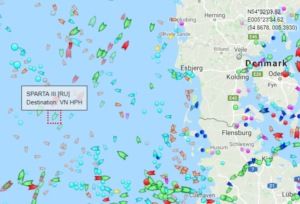News
Russian ships secretly transporting hazardous goods in Danish waters
This article is more than 7 years old.
Vessel chartered by Russian defence failed to inform Danish maritime authorities about its dangerous cargo

Sparta III is currently in the North Sea west of Denmark (photo: MarineTraffic.com)
According to Information newspaper, Russian ships are moving through Danish waters without notifying the maritime authorities they are carrying dangerous goods.
Over the weekend, a vessel named Sparta III left St Petersburg and before reaching Skagen at the northern tip of Jutland it declared it was transporting harmless goods.
It was only after it had passed Skagen that it declared it was loaded with goods marked with the highest classification of dangerous goods: ‘Cargo Hazard A (Major)’.
READ MORE: Russia: Denmark hasn’t asked for help in Danske Bank scandal case
Not the first time
The ship – which was reportedly headed for Haiphong, Vietnam – was apparently chartered by the Russian Ministry of Defence to transport weapons on behalf of the state-owned arms company Oboronlogistika.
“If vessels are passing through territorial waters under false pretence, it’s a serious problem,” Siemon Wezeman, a senior researcher at the Stockholm International Peace Research Institute, told Information.
“We know that contracts have been established and that there are new ones on the way between Russia and Vietnam. Among other things, the contracts involve heavy equipment like armoured vehicles, tanks and anti-aircraft systems. We register ships bound for Vietnam with weapons all the time.”
Wezeman contends that more Russian weaponry exports are shipped out from St Petersburg than any other Russian port – and therefore pass through Danish waters.
Information regarding shipping loads are provided via the AIS warning system, which uses radio signals to deliver information such as the ship’s course, speed and destination.
The Russian Embassy in Copenhagen has yet to make a statement regarding the issue, but Information newspaper maintains that it’s not the first time that a Russian ship carrying weapons has passed through Danish waters having declared it was loaded with normal goods.










































